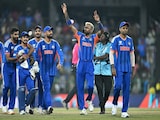- Somebody must be accountable for social media content, the Supreme Court emphasised today
- The Solicitor General said user-generated content lacks accountability on obscenity and perversion
- Court seeks autonomous body for content regulation with expert members including judiciary
Somebody has to be accountable for content uploaded on social media, the Supreme Court said today, as it brainstormed solutions to the issues that emerged during India's Got Latent case that brought several YouTubers such as Ranveer Allahbadia and Samay Raina under the spotlight.
During the hearing, Solicitor General Tushar Mehta, appearing for the Centre, said that the matter before the court concerns not just obscenity but perversion and said this was a lacuna for user-generated content. "Freedom of speech is an invaluable right, but it cannot lead to perversity," he said.
"This is the problem, so I create my own channel, I am not accountable to anyone... somebody has to be accountable," Chief Justice Surya Kant said.
The matter of content seen as 'anti-national' came up too. "Where the content is perceived as anti-national. Will the content creator take responsibility for?" Justice Joymalya Bagchi, also part of the bench, said. "The difficulty we are facing is the response time, once the scurrilious material is uploaded, by the time the authorities react, it has gone viral, to millions of viewers, so how do you control that?"
Advocate Prashant Bhushan, appearing for a professor with disabilities who wants to be part of the discussion, warned that the cost of labelling content anti-national can be worse than the benefits.
Justice Bagchi responded, "Forget shreds of anti-national, supposing there is a video which shows that this part is not part of India, what do you do about that?"
Bhushan argued that there are videos that discuss how a state became a part of India. "Someone may write an academic paper on history, someone may write about the dangers of a particular COVID-19 vaccine." Mehta objected, "You are instigating, do not give these examples."
The Chief Justice intervened and said, "This is why we are pitching for an autonomous body... in this society, the children also have a fundamental right to express."
"If you allow everything to be aired and telecast, then what will you do? Are you expecting that innocent people will go and defend themselves... not everyone will have access to this court," he added.
The court asked the Centre why such instances continue to come up if a monitoring mechanism is in place.
The top court then gave the Centre four weeks to bring regulations to deal with user-generated social media content. Justice Bagchi said, "There should be a warning for someone who may be shocked by such content. Not just above 18... To say that it has content not suitable for general consumption."
The Chief Justice pointed out, "The issue is that a disclaimer is given and the show starts. But by the time you decide not to watch, it starts. The warning can be for a few seconds... then perhaps ask for your Aadhaar card etc, so that your age can be verified, and then the programme starts." He clarified that these are only illustrative suggestions.
The court said an autonomous regulatory body can have a combination of different experts, including someone from the judiciary and the media. "Let something come up on a pilot basis and if it clogs free speech and expression, it can be looked at then. We need to build a responsible society, and once that happens, most of the problems will be solved," it said.
On The Samay Raina Case
The case of comic Samay Raina, who landed in trouble for his remarks on persons with disabilities, came up during the hearing as the court asked if the "children" -- referring to Raina and other comics -- were "behaving" now. Senior Advocate Aparajita Singh, appearing for an organisation fighting for the interests of those suffering from Spinal Muscular Atrophy, said these children were ridiculed and humiliated by Raina.
"All these children are accomplished and highly talented. When such comments are made on a platform such as, it becomes difficult for crowdfunding," she said. Samay Raina, she said, has said he deposited Rs 2.5 lakh in their accounts. "But we don't want that. We are here for our dignity."
The Chief Justice then told the Solicitor General, "Why don't you think of a very stringent law which is on the same lines like SC/ST Act where there is punishment if you demean them." The Centre's top lawyer agreed, "Humour cannot be at the cost of someone's dignity."
The court then asked Raina to consider hosting a show for those suffering from Spinal Muscular Atrophy. "They don't want your money. They want dignity and respect. Use your platform to show their achievements," the bench said.















